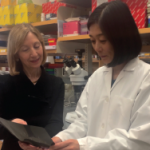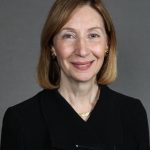Prestigious Carol Nachman Prize for Research in Rheumatology Awarded to Ellen Gravallese
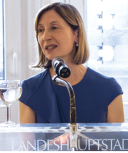
Ellen M. Gravallese, MD
On May 10, Ellen M. Gravallese, MD, the Myles J. McDonough Chair in Rheumatology and chief of the Division of Rheumatology at University of Massachusetts Medical School, Worcester, was awarded the prestigious Carol Nachman Prize for lifetime achievement in rheumatology research in Wiesbaden, Germany.
Each year the prize committee nominates distinguished researchers who have made contributions to rheumatology and immunology. Dr. Gravallese was notified of her nomination in February. As is the practice each year, the nominating committee requested her curriculum vitae, a summary of her research work and 10 of her most important research papers. In her response to Prof. Dr. Elisabeth Märker-Hermann, curator of the Carol Nachman 2018 Prize, Dr. Gravallese reflected on the immense changes in the field to which her laboratory, focused on the pathogenesis of inflammatory arthritis, has contributed.
“When my laboratory began this work, the mechanisms by which inflammation in synovial tissues in rheumatoid arthritis [RA] resulted in destruction of bone were not understood,” she wrote. “Patients in our clinics with RA were wheelchair bound, with no clear explanation for the obvious joint destruction.”
Elucidation of bone destruction pathways, such as the link between RANKL, osteoclastogenesis and bone erosion, has contributed to new targets for intervention, resulting in a sea change for people with inflammatory arthritis.
The Rheumatologist has profiled Dr. Gravallese’s impressive career contributions. Her work has been funded by the National Institutes of Health (NIH), the ACR and others. Among past honors, she received the 2017 Stephen M. Krane Award from the American Society of Bone and Mineral Research for outstanding achievements in basic, translational or clinical research in inflammation and skeletal matrix biology. She has served as an associate editor of the New England Journal of Medicine since 2016 and will serve as ACR president beginning this November.
Awarding the Prize
According to Prof. Dr. Georg Schett, chair of internal medicine at Friedrich–Alexander University, Erlangen-Nürnberg, a previous recipient of the prize and a current member of the prize committee, Carol Nachman was a businessman born in Romania in 1897. Forced to leave Germany in 1935, he worked abroad in the financial industry. After WWII, he returned to Germany and opened a casino in Wiesbaden. Mr. Nachman, who developed RA, supported many social projects, among them the Carol Nachman Prize for Rheumatology beginning in 1972. He died in Wiesbaden in 1993.
Awarding the prize is a special event in Wiesbaden. Each year at the town hall, the award is conferred by the Lord Mayor of Wiesbaden, and attendees at the ceremony comprise a mix of German rheumatologists, past prize recipients, members of the Nachman Prize Committee, rheumatology patients and townspeople. One of the highlights for Dr. Gravallese was seeing the American flag fly in front of the Wiesbaden town hall in tribute to her.
The prize is accompanied by a generous monetary award. “As a lifetime achievement award, the prize is really an honor,” says Dr. Gravallese. “It is humbling to be listed among the other award recipients and very satisfying to think that your work may have had an impact on the field.”
Rheumatology Research Foundation Fellow in Training Accepts Appointment at University at Buffalo
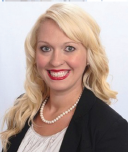
Alysia Kwiatkowski, DO, MS
In 2018, Alysia Kwiatkowski, DO, MS, a rheumatology fellow at Rush University Medical Center, Chicago, took the advice of her division director, Joel A. Block, MD, the Willard L. Wood, MD, Professor of Rheumatology, to engage in rheumatology issues at the national level. Dr. Block and another mentor, Sonali Khandelwal, MD, assistant professor in the division of, and associate program director for, the internal medicine training program, “encouraged me, knowing that much of my research is in medical education,” Dr. Kwiatkowski said recently.
After being nominated by Dr. Block, Dr. Kwiatkowski joined the Rheumatology Research Foundation last November as a fellow in training invited guest. The appointment dovetailed with her research in medical education, in which she compares team-based learning with non-interactive or moderately interactive sessions and explores the incorporation of musculoskeletal examination workshops into rheumatology electives.
This fall, Dr. Kwiatkowski will move to the University at Buffalo (UB), New York, where she will be taking on multiple roles. She will combine teaching and clinical work as an assistant professor, and spend a considerable portion of her time working in the Medical Education and Educational Research Institute (MEERI), established by the Jacobs School of Medicine and Biomedical Sciences. There, she will have protected time to continue her research. The move to Buffalo will also be a homecoming for Dr. Kwiatkowski, who was born in the city and did both her undergraduate and master’s work there.
“It’s actually a wonderful time to head back,” she says. The city has “a new children’s hospital (the John R. Oishei Children’s Hospital), the medical campus has been significantly upgraded and [the city] is making an enormous effort to recruit young professionals to the area.” Buffalo is also where she first became attracted to rheumatology. While in college, she worked as a medical assistant to a rheumatologist in private practice and became fascinated with the complexities of the diseases and the opportunity for long-term provider-patient relationships.
“It was rheumatology that drew me to medicine, and not the other way around,” she recalls.
Dr. Kwiatkowski looks forward to her new venture in her hometown, engaging with patients and students, and helping to further the science of medical education.
Alfred Kim Honored with Lupus Leadership Award
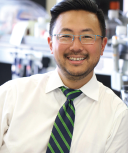
Alfred H.J. Kim, MD, PhD
Alfred H.J. Kim, MD, PhD, assistant professor of medicine, assistant professor of pathology and immunology, and co-director of the Lupus Clinic at Washington University (WashU), St. Louis, Mo., has received the 2018–2019 Lupus Leadership Award from the Heartland Chapter of the Lupus Foundation of America (LFA). In his honor, the Heartland Chapter produced a video about his achievements as a clinician.
Dr. Kim’s affiliation with the local chapter of LFA began shortly after he started the Lupus Clinic at WashU, he says. “When I started the clinic, my intentions were to consolidate and improve the delivery of healthcare to our patients, to start translational and clinical research projects related to human lupus at WashU, and to improve our relationship with the local community.”
As part of the latter goal, he joined the Heartland Chapter Board of Directors. The relationship, he says, has been “very synergistic—their current infrastructure for programs, support groups and advocacy have been important for our clinics, [because] we didn’t offer many of those services.”
The clinic currently serves more than 350 patients, two-thirds of whom are African American. There are now seven ongoing clinical and translational research projects addressing some of the most pressing unmet needs in SLE, such as the NIH-funded CASTLE (Complement Activation Signatures in Systemic Lupus Erythematosus) study led by Dr. Kim. He and his colleagues have continued collaborations with LFA, as well as St. Louis University. The efforts have revolved around rewriting curricula for providing skills to support groups, patients and caregivers as they cope with lupus.
Dr. Kim is intrigued with the challenges of teaching the SLE curriculum to medical students. “The complexity of this disease provides incredible richness for investigators in their academic careers, but trying to simplify the message about lupus to trainees without dumbing it down is a challenge for the people teaching it,” he notes.
Dr. Kim was also awarded the 2017 Distinguished Service Teaching Award from Washington University School of Medicine. He credits mentoring from John P. Atkinson, MD, Samuel B. Grant professor of clinical medicine, and Richard D. Brasington Jr., MD, professor of medicine, for giving him support and instrumental encouragement in his own career path.
“Seeing how they describe the disease was fascinating, because many of the same tools they use for students, they also use for patients. This makes sense, because as a teacher you’re trying to distill the information so that others [trainees or patients] can appreciate core principles and then be able to describe it.”
Dr. Kim has been able to reach his patients in this same way, giving them tools to cope with this complex disease. One of his patients, who appears in the commemorative video, put it this way: “Even though I still have lupus, lupus does not have me.”
Gretchen Henkel is a health and medical journalist based in California.

